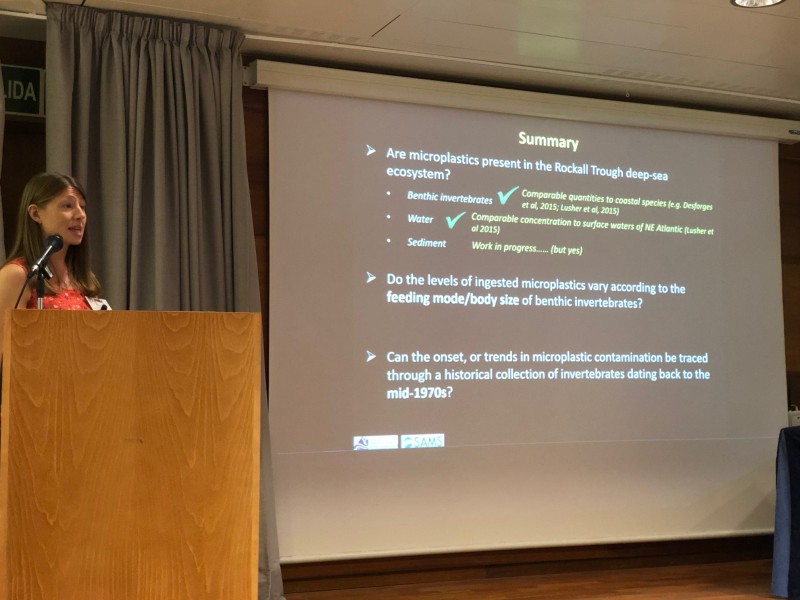Presenting at MICRO2018 International conference
Winnie Courtene-Jones
Scottish Association for Marine Science

In November I attended MICRO2018 International conference, in Lanzarote, an opportunity made possible thanks to the Challenger Society travel award. This biennial conference is focussed on developing understanding and sharing current research on the prevalence and impacts of plastic pollution (including microplastics and nanoplastic) throughout the environment.
I gave a presentation entitled ‘Microplastic pollution in the deep sea ecosystem: a case study from the Rockall Trough’. It was a privilege to share my PhD research on an International stage; it was well-received and led to some fruitful discussions. My PhD research examines microplastics ingested by deep-sea invertebrates and contained within deep waters and sediments. Also, through the utilisation of historical deep-sea invertebrates has tracked microplastic pollution back in time to the mid-1970s (our earliest samples) to explore the long term prevalence of microplastics on the seafloor.
The five-day conference was packed with fascinating talks and it was a challenge to decide which of the parallel sessions to go to – I wish I could have attended them all! The conference supports a number of disciplines all coming together to tackle the complex problem that is microplastics pollution. Sessions ranged from ecotoxicology, physical oceanography and hydrodynamic modelling, ecosystem monitoring, policy, social sciences, science communication and science-art collaborations. Such a range of disciplines made for fascinating discussion and some really inclusive thinking on potential solutions. There were too many interesting presentations and posters to describe in this short-piece, but if you are interested to find out more about the range of topics presented you can check out #MICRO2018 on twitter to see the hot off the press news shared by the microplastics community during the conference.
In addition to the very full scientific programme there were a number of additional evening activities including a science-policy workshop, a short concert from local Lanzarote musicians, a science-communication film, a lecture from Professor Maria Cristina Fossi and a very engaging lecture from Professor Richard Thompson OBE.
Having attended the conference two years ago (MICRO2016), it was fantastic to see the increase in the amount of microplastics research being carried out internationally, attendance was nearly double that of in 2016. Also, to see how the science has progressed, and of course it was a fantastic opportunity to catch up with other researchers who I had met at the last conference. During my career I have been fortunate to attend many conferences, but the supportive and inclusive atmosphere at MICRO2018 is unlike at any other conference. Of course, Lanzarote also makes a wonderful location; there’s nothing quite like enjoying your lunch break on the beach in the sun with the new friends you’ve met.
MICRO2018 provided invaluable opportunity to network, meet eminent scientists from across the globe and learn about the latest advances in microplastic science. Being at the very end of my PhD, I truly feel I was able to make the most of such an opportunity, not only to share my research but to make connections for the future. I thank the Challenger Society for their support which enabled me to participate, and also to all of the microplastics community for their enthusiasm which has left me even more motivated and excited for the future.
Latest News
Royal Society Publishing Photography Competition 2025
Please see a message from the Royal Society below:
We are delighted to announce that the 2025 Competition is now open for entries until 15 August for a chance to win £1000! The competition celebrates the power of photography in conveying the wonder of science happening all around us and photographs can be submitted in the categories of: Astronomy, Behaviour, Earth Science and Climatology, Ecology and Environmental Science, and Microimaging.
The competition is free to enter and open to anyone studying or working in science at graduate level or above. Category winners will receive a one-year membership to the Royal Photographic Society and the overall winner will receive a grand prize of £1,000. Find out more: https://bit.ly/RSPphotocomp
October 2025 MEDIN Workshop: Marine Data Management, Governance and the MEDIN toolset
The Marine Environmental Data and Information Network (MEDIN) are pleased to announce that registration is now open for the next occurrence of our popular free online training workshop: ‘Marine Data Management, Governance and the MEDIN toolset’ on the 13th – 17th October 2025 on OceanTeacher Global Academy.
Marine Data Management, Governance and the MEDIN toolset
The Marine Environmental Data and Information Network (MEDIN) and OceanWise are delighted to invite you to attend our popular free online training workshop: ‘Marine Data Management, Governance and the MEDIN toolset’ on the 19th – 23rd of May 2025.
